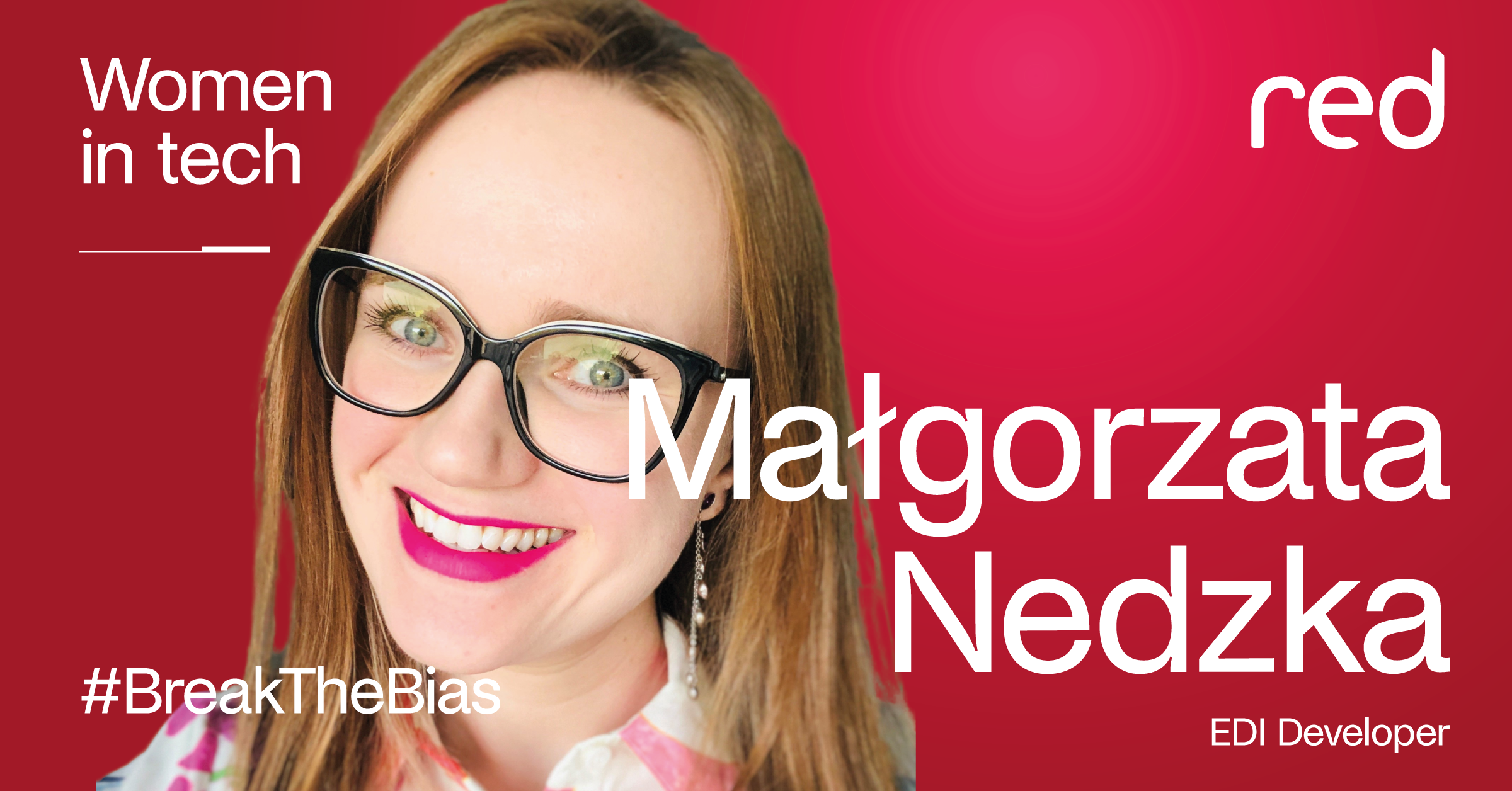Women in Tech | RED Global Q&A session with Małgorzata Nedzka
Blog post

Is there still bias in the tech industry? Do women have the same opportunities as men and why are still less women than men in tech? We’ve asked Margo, an EDI Developer, and pilot, based in Poland.
1.Tell us about yourself.
My name is Małgorzata, but at work I’m better known as Margo. I’m an EDI Developer (EDI- Electronic Data Interchange) and I’m working for Electrolux, in Poland. I’ve been working in IT for the last 10 years. Outside of work, I am a pilot, I have a PPL license and I am learning to become a commercial pilot (but I still want to develop my technical and analytical skills). In my free time I play instruments: accordion, piano and want to improve my saxophone playing. I even played in two albums. I also started my adventure with diving, but stopped because of flights
2. Can you tell us what you do in your role on a day-to-day basis?
Imagine a huge company that sends thousands of documents a day. Posting and manual verification would consume a lot of time and money. I create a whole system that does this automatically. Starting from communication such as SFTP, AS2, through automatic document mapping, creating scripts, to testing and implementation for production.
3. What’s the most exciting thing about your job?
I enjoy analysing and solving technical problems or creating something complicated. In addition, I work with a very experienced team, which allows me to learn something new every day. Besides, EDI is a very broad field, so after a few years, it’s still an interesting job for me.
4. What influenced you to pursue a career in tech? How did you get into tech? Did you always know that working in technology was what you wanted to do?
I always wanted to go to the Air Force Academy. In the past, to be admitted, one had to pass a math exam, which I was very weak at back then. That's why I decided to learn it first and started studying applied mathematics, physics, and computer science. In the end, I didn't even try to get into the Air Force Academy, but I noticed that I gained new problem-solving and analytical thinking skills. With these skills it was easy to find an IT job.
5. What are the biggest challenges you’ve faced in your career?
I once had to create code in a programming language that is unique and didn’t have any good resources available to learn from. I only had a few days to get that done, so I spent my private time learning programming based on the existing solutions with that given code.
6. Do you feel there is gender bias in the workplace, or have you experienced it yourself? If so, how did you overcome it or how are you managing it?
I work with great people, and I have never felt discriminated at work because I am a woman. However, outside work, very often. When I offer help with tech problems, people will turn to another man first. So, I first have to go through the prejudice barrier and show that I am a professional. Although it is not pleasant, thanks to this experience I make fewer mistakes, I’m more accurate and I have an enormous satisfaction when I help guys afterwards.
7. What do you think are the biggest obstacles that a woman working in the technology sector faces?
In my opinion, obstacles that we create ourselves. Lack of knowledge, willingness to learn but also lack of self-confidence. However, this applies to both women and men.
8. Do you feel that women have the same opportunities as men in the tech industry?
Unfortunately, not necessarily biological aspect of motherhood. However, if a woman decides not to have children, I think the chances are more or less even.
9. Why do you think there is a lack of women in the tech industry?
The technological part that I deal with requires constant learning, searching for information, mindfulness, and the will to develop. Not everyone is attracted to that, for some (both men and women) can be tiring or simply boring.
10. Do you think it is harder for a woman to grow her career and have a personal life? And if so, how can we overcome these challenges?
I am developing my career and private life and I have no problem with it. But I don't have children ... For me, learning and self-improvement are extremely important, so I personally would like to return to work as soon as possible after giving birth (if I decide to become a mother). But nature is cunning, hormones can flood my brain, and then I can say that motherhood is the greatest role in the world and work will never be as important to me as before. So, what will happen in a few years is like reading tea leaves.
11. How has the tech industry changed since you’ve started your career?
There are quite a few tools that make the job easier, better hardware, and cool new systems.
12. Have you had any mentors who’ve helped you grow?
No one has ever taught me how to do things step by step, but I met a few people that I admired for their vast experience and high intelligence. I just wanted to become like them one day.
13. What advice would you give to a woman considering a career in tech?
You can be a great specialist and be successful when you like what you do and when you enjoy it. Making dreams come true gives you wings and then everything seems to be achievable. It is also worth working on emotional intelligence because it is an aspect that is rather ignored, and in my opinion, it helps a lot in achieving success.
Thank you, Margo for this great interview and for the great insights of how obstacles can become opportunities. Not being trusted as a knowledgeable tech professional, didn’t discourage Margo, but instead she pushed herself to become even better at her job. As seen also in the other Women in the workplace RED interviews, self-confidence is key to success and often is the obstacle that stopes women from pursuing bigger careers. Studies have shown that men are on average more self-confident than women. So, what can employers do? As cited in Forbes, employers should rely less on one’s self-promotion and more on performance results.
Read our Women in the workplace interviews:
Your Cloud Career Toolkit
Resources
Finding your dream job and navigating your way through a successful career can be challenging.
When it comes to finding a cloud job and dealing with the challenges that may arise in your cloud career, we’ve got the expertise to ensure your success.
In this Cloud Career Toolkit, we'll explore the exciting world of cloud computing and show you how to take the first steps towards a rewarding career in this dynamic field.
If you have any feedback about the toolkit, we'd love to hear from you.
To download our free Cloud Career Toolkit, fill out the form and click 'download'.




.png?r=a0-s768.768-o)
.png?r=a0-s768.768-o)
.png?r=a0-s768.768-o)
(1).png?r=a0-s768.768-o)
.png?r=a0-s768.768-o)
.png?r=a0-s768.768-o)
.png?r=a0-s768.768-o)
.png?r=a0-s768.768-o)
.png?r=a0-s768.768-o)
.png?r=a0-s768.768-o)
.png?r=a0-s768.768-o)
.png?r=a0-s768.768-o)
.png?r=a0-s768.768-o)
.png?r=a0-s768.768-o)
.png?r=a0-s768.768-o)
.png?r=a0-s768.768-o)
.png?r=a0-s768.768-o)
.png?r=a0-s768.768-o)
.png?r=a0-s768.768-o)
.png?r=a0-s768.768-o)
.png?r=a0-s768.768-o)
.png?r=a0-s768.768-o)
.png?r=a0-s768.768-o)
.png?r=a0-s768.768-o)
.png?r=a0-s768.768-o)
.png?r=a0-s768.768-o)
.png?r=a0-s768.768-o)
.png?r=a0-s768.768-o)
.png?r=a0-s768.768-o)
.png?r=a0-s768.768-o)
.png?r=a0-s768.768-o)
.png?r=a0-s768.768-o)
.png?r=a0-s768.768-o)
.png?r=a0-s768.768-o)
.png?r=a0-s768.768-o)
.png?r=a0-s768.768-o)
